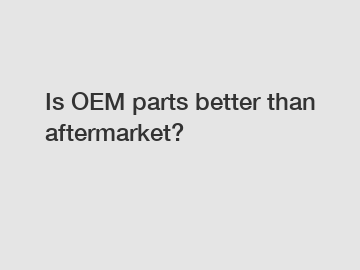Is OEM parts better than aftermarket?
Is OEM Parts Better Than Aftermarket?
When it comes to repairing or replacing parts in your vehicle, you have two primary options: OEM (Original Equipment Manufacturer) parts or aftermarket parts. OEM parts are made by the same company that produced the original parts in your vehicle, while aftermarket parts are manufactured by third-party companies. Car owners often debate which option is better. In this article, we will explore the advantages and disadvantages of both OEM and aftermarket parts to help you make an informed decision.
OEM Parts: The Pros and Cons.

OEM parts are often considered the default choice when it comes to replacing any part in your vehicle. Here are some of the advantages of using OEM parts:
1. Quality and Compatibility: As OEM parts are made by the original manufacturer, they are specifically designed to fit your vehicle perfectly. They are also built to the same standards as the parts that came with your car, ensuring high quality and compatibility.
2. Warranty: Purchasing OEM parts often comes with a warranty from the manufacturer. This warranty can provide peace of mind, knowing that you are covered in case of any defects or malfunctions.
3. Consistency: OEM parts ensure consistency in terms of performance and reliability. Since they are made to the same specifications as the original parts, you can expect them to function just as well.
However, there are a few drawbacks to consider:
1. Price: OEM parts are typically more expensive than their aftermarket counterparts. If you are on a tight budget, it may not be the most cost-effective option.
2. Limited Availability: OEM parts may not be readily available at all automotive stores. You might have to visit a dealership or order them directly from the manufacturer, which can be an inconvenience.
Aftermarket Parts: The Pros and Cons.
Aftermarket parts are manufactured by third-party companies and offer an alternative to OEM parts. Let's explore their advantages:
1. Cost: Aftermarket parts are generally more affordable than OEM parts. If you're looking to save money, they can be an attractive option.
2. Variety: Aftermarket parts come in a wide range of options. Since multiple manufacturers produce them, you have more choices when it comes to brands, features, and prices.
However, there are a few downsides to consider:
1. Quality: While some aftermarket parts may match the quality of OEM parts, others may be of inferior quality. It's crucial to do thorough research and purchase from reputable manufacturers to ensure you're getting a reliable product.
2. Compatibility: Due to variances in manufacturing, aftermarket parts may not fit as perfectly as OEM parts. This can lead to installation challenges or functional issues.
Making the Right Choice for Your Vehicle.
When deciding between OEM and aftermarket parts, it ultimately comes down to personal preferences and priorities. If top-notch quality and compatibility are your primary concerns, OEM parts may be the best choice for you. On the other hand, if you are on a budget or value a wider range of options, aftermarket parts might be a suitable alternative.
If you're unsure about which option to choose or need assistance with parts for your vehicle, don't hesitate to contact us. Our team of experts is here to help you make an informed decision and provide the best solutions for your automotive needs.
For more starter motor manufacturer, starter motor manufacturer, starter motor manufacturerinformation, please contact us. We will provide professional answers.


